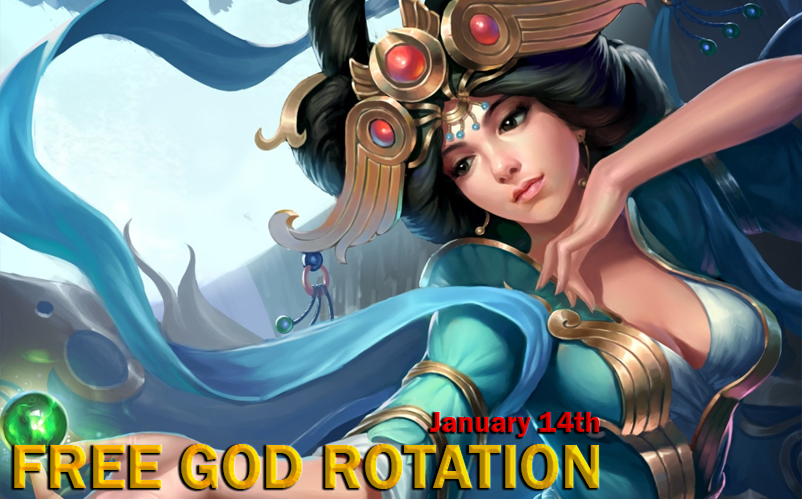
Chang’e, Faerie of the Moon – Chinese
TYPE: Ranged, Magical
Not always born in the crucible of creation, sometimes Gods ascend by tragic happenstance. Such is the tale of Chang’e, Goddess of the Moon.
Among the immortals that lived in the Heavens, Chang’e was the most elegant dancer, like a dove on windswept currents. She drew the affection of the hero archer, Hou Yi, and the two were soon married. Everything was perfect.
Yet, beneath the Heavens, all was not well. Ten suns, the ten children of the Jade Emperor, rose to scorch the earth and boil the seas. Brave Hou Yi, bow in hand, shot nine from the sky, sparing only one. Though the world was saved, the Jade Emperor was furious his children were killed. In punishment, Hou Yi and Chang’e were made mortal.
Chang’e grew melancholy and danced no more. To restore their status in the Heavens, Hou Yi found the Elixir of Immortality, but thieves came to steal it while he was hunting. Chang’e struggled to hide the Elixir, but, in the end, was forced to drink it. Too much for one person, the Elixir gave her immortality, but it also swept her into the sky.
Since then, Chang’e has lived on the moon, forbidden to see her husband, a Jade Rabbit her only companion. Yet, the Earth is once again in peril, and Chang’e finds herself upon the mortal surface. Perhaps, this is a second chance. If only she can save the world without angering the Jade Emperor, she can at last reunite with her husband.

Athena, Goddess of Wisdom – Greek
TYPE: Melee, Magical
In war, there are two kinds of soldiers: those that fight for blood, and those that fight for honor. The first crave the clash of steel and smell of slaughter, the latter know the wisdom of justice, the kindness of mercy, and that life should never be taken wantonly. These different warriors seek different Gods. Ares, God of War revels in the bloodletting, but his sister, Athena, Goddess of Wisdom, is patron to those who fight with dignity, and only when there is no other alternative.
Favored daughter of Zeus, wise as ten thousand scholars, just as the scales themselves; Athena is a paragon of incorruptible virtue, and worshipped with righteous fervor. So revered is she that Athens, greatest city in all the world, is named for her, and regal temples adorn the countryside in her honor, each tended by loyal priestesses. To Athena, a life is a precious thing that need not be wasted in frivolous battle. Bloodthirsty Ares, on the other hand, is reviled by their father and chained by his ravenous subjects.
At the Siege of Troy, Ares disobeyed Zeus and joined with the battle, fighting for the mortal Trojans. Athena rose to stop him, indirectly championing the Greeks, but directly keeping the order of divine law. Their fierce battle clashed in unspeakable proportions, ending only when Ares limped from the battle field, cowed by his sister and rival. With Ares diminished, the tide of the war shifted and the heroes of the Greek Army toppled Troy.
In times of war, prayers are sent to both Gods. Ares, for bloodstained victory, Athena for honor, valor, and the wisdom to fight with dignity. Make no mistake, these are times of war, and Ares has already answered the call to arms. Athena, ever cautious with lives, goes to battle without eagerness, but solemn necessity, for the Goddess of Wisdom knows honor is for the living. The dead have no need of it.

Nemesis, Goddess of Vengeance – Greek
TYPE: Melee, Physical
Of arrogance and pride, the Greeks have but one word: hubris. It is a crime against Gods and Men, but a crime many commit with impunity. Even mighty Zeus is guilty. But when punishment is due, there is one from whom even the God of Thunder shrinks. She is Nemesis, the red-washed blade of Divine Retribution.
Recall the tale of Narcissus, so taken by his own beauty. Proudly, his visage was flaunted, to the detriment of all. Until, at last, he was led to a pond of crystal hue where his own reflection enraptured him. So long did he remain to gaze upon this self-image that hunger claimed his life. Thus does Nemesis respond to hubris. It is consequence equal to the crime.
Now, behold the war torn land, beset by the wrath of wanton Gods filling the air with blood and boasts. This battlefield is stained with hubris. Unwittingly, these foolish warriors have summoned their greatest adversary. Nemesis has come!
No longer will foul deeds engender success, no hoard of wealth held in undeserving hands, no legends told when falsely earned. Nemesis will unleash a tide of retribution. Punishment for the crime of hubris is death.

Ullr, The Glorious One – Norse
TYPE: Ranged, Physical
Amongst the snow-capped forests of the frigid north resides the hunter-God of Glory, Ullr. Reserved, secretive, Ullr does not represent the tankard downing, boast bellowing contemporaries of the Norse Pantheon, but pays respectful tribute to glory in all its forms.
Glory is in the silence of snowfall, in the honorable victory earned from single combat, in the perfect curve of a yew bow firing an arrow true. Dotted across the lands of the Faithful, shrines to Ullr can be found in remote, secluded hideaways. It is there that glory is found in the sanctity of a vow, once sworn, never broken, and bound by a ring, no matter how crude, then buried in the earth to weather the ages of time.
Though rarely spoken of, he is highly regarded, even among the Gods, for it is Ullr, not one of Odin’s sons that tends the throne of Asgard while the All Father is away. Other Gods might use the opportunity to abuse the power, but Ullr’s rule is merely an extension thereof. So much so that only the innermost circle even know that Odin is gone.
All the more noticeable is it, then, that Ullr has abandoned this post to join the fray. Early on did Odin take the field of battle, leaving Ullr to manage the kingdom. So great a threat must this war be as to endanger the very survival of Asgard. Whatever the reason, Ullr comes to preserve glory, which, for him, may be the whole world.

Chaac, God of Rain – Mayan
TYPE: Melee, Physical
Rain is life. Showers from above soak the earth, feeding seeds which grow into precious fruits and grains. Man and beast alike are sustained by this cycle. Without rain, this world would be barren and all living things would turn to dust. Thus is the power of Chaac, God of Rain. But, like all great power, it did not come without cost.
In mankind’s earliest days there were no farmers, so they starved beneath the sun. For days, Chaac sought a way to feed them. Deep in the mountains he discovered a golden boulder and cleft it with his mighty axe. Within was Maize, the crop that would change the Mayan people forever, and Chaac was worshipped and adored for it.
Drunk with pride, Chaac sought the object of his deepest desire, the wife of his brother. For a time, their affair remained secret, but that was not to last. Chaac’s brother, the Sun God, discovered them. Without a word, she dutifully returned to her husband and Chaac, realizing what he had done, let her go, but a rift formed between the two brothers that would never heal. In his grief, Chaac drove his axe into the sky, and from the wound tears of regret fell.
Since then, Chaac has chosen a life free of pride and selfishness, devoting himself only to mankind. As a reminder of his greatest failing, he continues to cleave the heavens, washing the land in sustaining waters. Thus do crops grow. Thus do the people survive. Thus is the power of Chaac, God of Rain.





